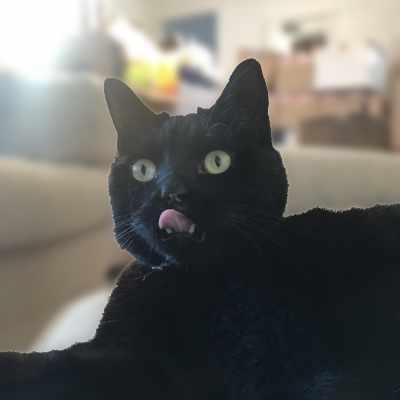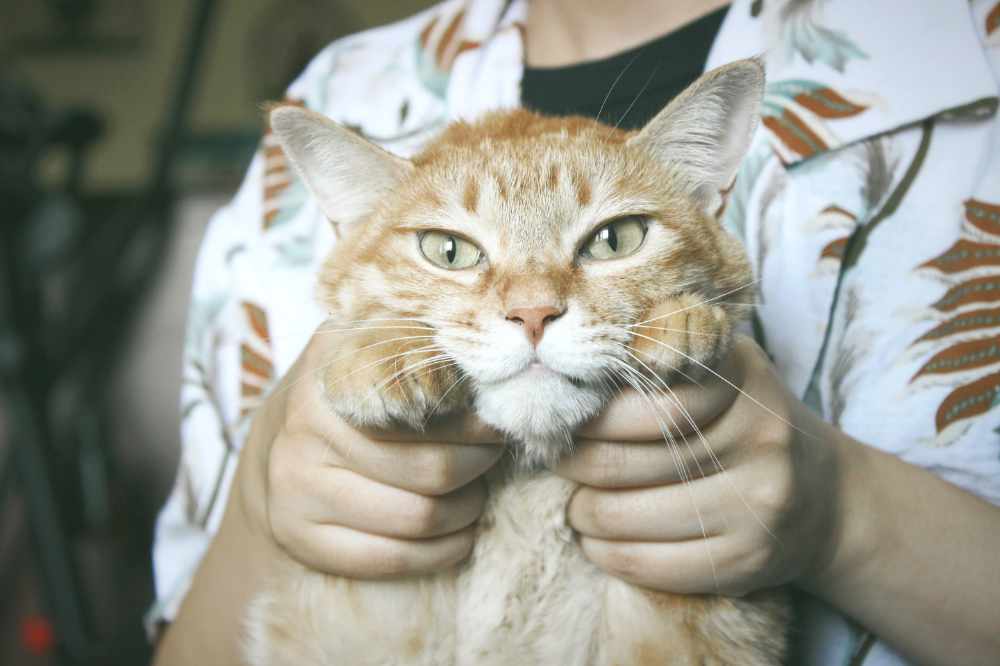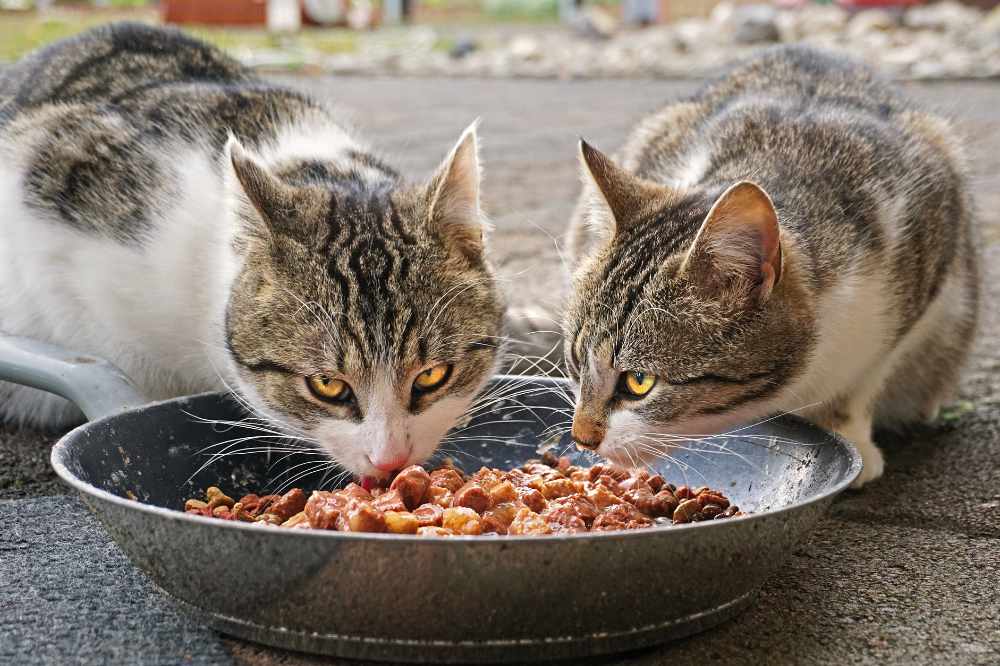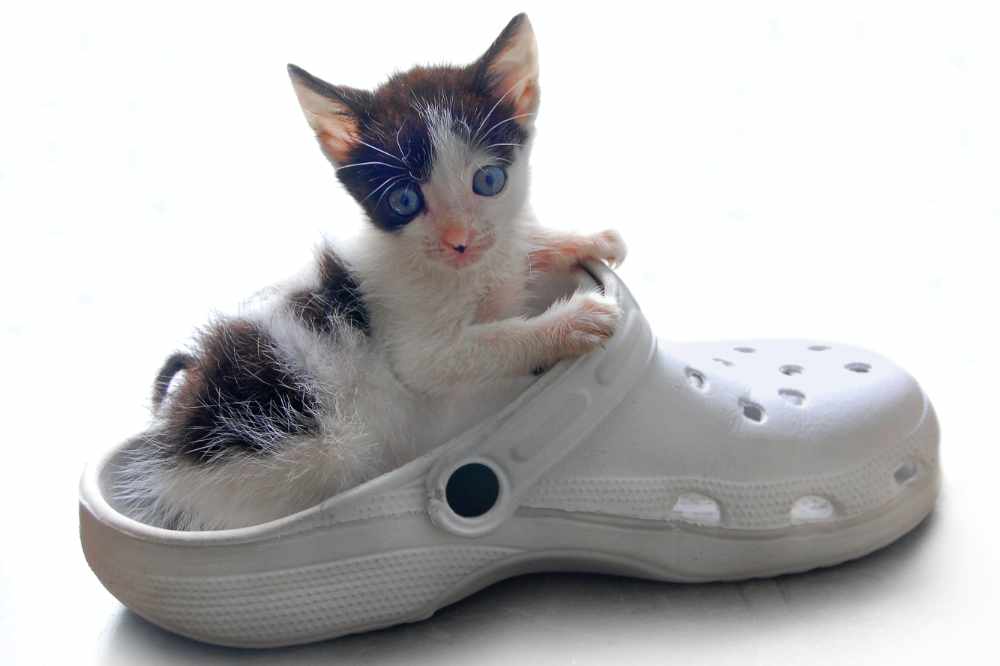Cats can be notorious for being picky with their food. Some cats will happily chow down on their kibble, licking their lips with enthusiasm until you buy a large bag of the stuff and suddenly they refuse to eat it.
It can be a worrying time for you if your cat stops eating their food and if you’re ever concerned about your kitty then it’s always best to get them checked over by a veterinarian.
At times your cat may not go off their food completely but they seem to develop different behaviours when it comes to feeding time and this can equally be frustrating and confusing for you.
If suddenly your cat eats treats but not their food then this is a problem. Cat treats are not balanced or healthy and your cat will get sick if this continues. Take them to a veterinarian to get checked over and then make sure that their feeding routine is enjoyable for them.
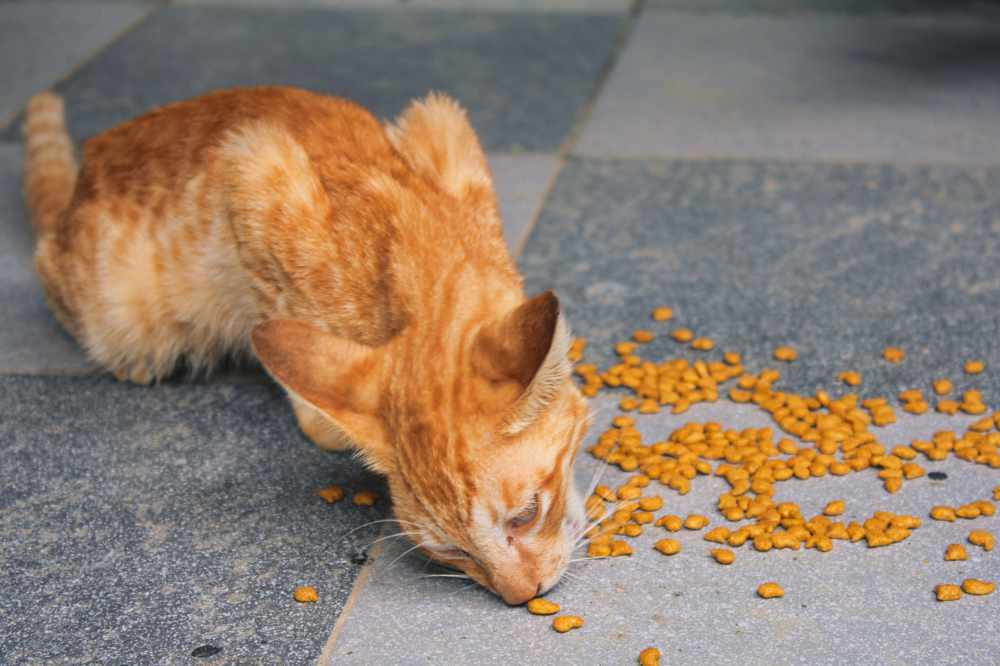
Treats vs Cat Food
Cat treats are typically made of high calorie, very palatable ingredients that make them a very enjoyable reward for your pet. Although they taste delicious they are absolutely not a substitute for a balanced diet.
Most high quality cat food, whether it’s wet or dry, contains a complete, balanced diet for your pet. It’s perfectly balanced in all the macro as well as the micro-nutrients that your cat needs to grow, repair and stay fit and healthy.
If your cat seems to be preferring treats over their regular food that’s not a huge surprise but if they are refusing to eat their food in place of treats then this is a bit more concerning. Here are the ten most common reasons why your cat may be avoiding their dinner and what you can do to avoid this becoming a problem.
Dwindling Appetite
If you’ve noticed that your cat is not so keen to eat their regular food but they will still jump at the chance to enjoy a treat then this may be down to their appetite. If they’re not feeling as hungry as usual then a balanced meal probably isn’t the most enticing option whereas a highly delicious, super tasty treat is an easy yes.
There are many reasons why your cat’s appetite may be on the decline. They may be getting food from elsewhere or they may be exercising less than they used to so they are not as hungry. Things like age can play a role as well as illness or stress.
Is Your Cat Unwell?
If your cat has recently stopped eating their usual dinner then it’s really important to rule out illness. Your cat may not be so keen to eat because they are feeling nauseous, painful, or just not right. It’s always best to take them to a veterinarian as soon as possible so they can rule out anything nasty.
Things like dental disease, infections, kidney issues and even cancer can cause your cat to be less interested in food. Your vet will give your cat a full clinical exam and may choose to run blood tests or diagnostic imaging to rule out any disease. Even if they say all is well, at least you can rest knowing your cat is being fussy for another reason.
They May be a Fussy Eater
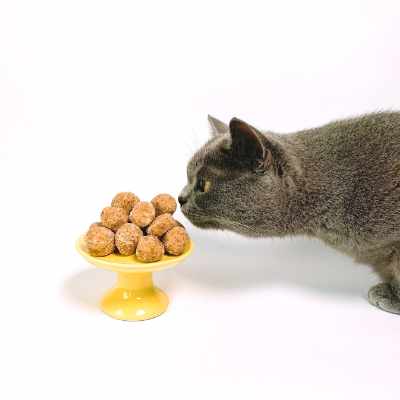
Once you’ve ruled out unwellness, it’s worth asking the question “is my cat just a fussy eater?” Cats are fussy by nature. They have evolved to live off fresh meat so are not scavengers by design. This equates to a highly developed sense of taste to help them avoid potentially dangerous spoiled meat.
Cats will selectively pick out certain textures, flavours, and even temperatures so if their food isn’t matching up with these preferences they may avoid it altogether. It’s important to establish which of these factors is most important for your cat so you can offer them a diet that’s best suited to their needs.
It Could be Due to the Feeding Routine (or Lack of)
Having food available all the time for your cat gives them more opportunity to avoid eating their main meal and opt for tasty snacks instead. If they know that they can leave the boring kibble and enjoy a few delicious, hand fed morsels later on then they will choose this option again and again.
If you often change up feeding times as well as what you feed your cat and how often then this will absolutely lead to your feline companion refusing their dinner. It’s best to stay consistent with your cats feeding routine and avoid giving too many treats between meals.
Food Bowl
Another point to consider with regards to your cats feeding habits is their food bowl. If it’s placed in a busy location they may find this too noisy to eat. Some cats prefer their food lower down whereas other feel safer high up. It’s a good idea to experiment with the placement of their food bowl to find a location that encourages your cat to eat their main meal with confidence.
It’s also really important to consider the food bowl itself and whether this could be putting you cat off eating their kibble. Cats have very sensitive whiskers and if the sides of the food bowl are too high then this can irritate them and make them less keen to eat.
Some cats can also end up becoming allergic to their plastic food bowls and develop a rash or other symptoms. Plastic is porous so bacteria can end up surviving in the cracks and this can be harmful to your cat. The safest option to choose is a low sided, stainless steel food bowl and clean this regularly.
Some cats prefer their food bowl to be slightly elevated off the ground to help alleviate arthritic pain. You can use an upturned plate or book to elevate the bowl and make your cat more comfortable.
Stress
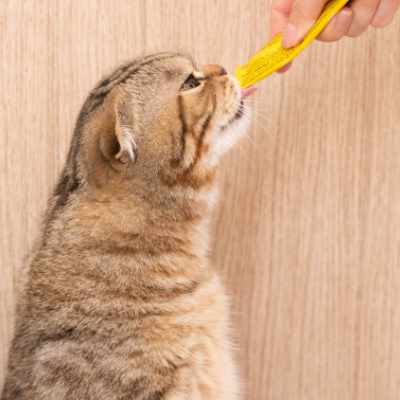
Your cat may stop wanting to eat their usual food if there’s something stressing them out. A change in your home dynamics such as someone moving in/out, moving house, renovation work or even a new pet can all be stressful for your cat. Different cats will respond to stress in different ways and not eating their main meal is a common behaviour that can arise.
If you feel that your cat may be stressed you can use calming pheromone plug ins, sprays, or add supplements to their diet. Try to minimise stress to your cat by providing them with a quiet, safe space in the home where they can go to relax.
Issues with the Food
It’s worth considering that your cat could be preferring their treats because their regular food is not an appealing choice. If the bag of kibble has been open for a while it may have gone stale or even mouldy and there’s little mystery as to why your cat would refuse this.
In the summer months when the weather gets warmer, cat food is prone to going off much faster so it’s worth considering this when storing your cats food. It can be a good idea to buy cat food in smaller portions/packets even if it’s more expensive, as this helps save money on waste in the long run.
They May Be Eating Out
Some cats prefer dinner on the go and they can be experts at supplementing their diet whilst they roam the neighbourhood. They may have found some cat food in a nearby porch or maybe your kind neighbours have been giving them an extra meal or two. Some cats are keen hunters and can find plenty of small critters to help them feel full.
If you feel your cat fits this description it can be a tricky issue to solve. It’s worth speaking to your neighbours and asking them kindly to not feed your cat even if it comes round begging for food. Sometimes the best option is simply keep your cat indoors or build them a run in the garden so they can’t wander too far.
Other Cat Competition for Food
If you have a multi-cat household then it’s very likely that some manner of competition will arise. Some cats will take on a bullying role and not allow their companions easy access to the food bowl. This can be stressful for the victim and makes them cautious to eat their meal.
If one of your cats is coming to you in search of treats to fill their stomach then it’s best to make sure there’s not a bullying problem going on. If this is the case then you will need to separate your cats when it comes to feeding time so that they both have a safe space to eat their food.
Are You Part of The Problem?
The final thing to consider if you’re finding that your cat seems to prefer treats over their main meal is your behaviour. Are you always reaching for the treat bag? Do you give your cat a lot of fuss and attention when it comes to treat time? Are you finding that treats are being given more and more frequently?
If you are giving your cat too many treats or overly rewarding them for asking for more then your cat will quickly learn to manipulate you. They will know how to press your buttons to ensure you give them so many treats that they don’t need a balanced meal.
Watch your behaviour and make sure treats remain infrequent. It may feel mean initially but by doing this you really are doing what’s best for your cats health.
Final Thoughts
There are lot of reasons why your cat may be ignoring their main meal and choosing to feast on tasty treats instead. It’s important to rule out any chance of illness as well as stress factors. Make sure your offering your kitty a tasty meal in an appropriate location so they feel safe to tuck in. Finally, make sure treats are not common place in a way that allows them to replace regular meals. Treats are a lovely way to bond with your pet as long as they remain a reward and not a diet!
